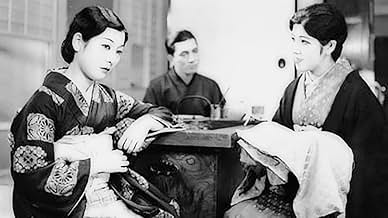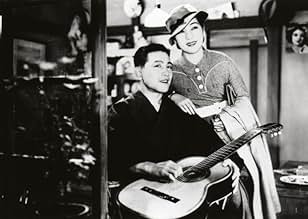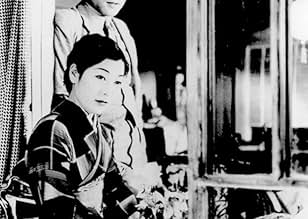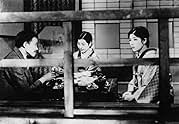Agrega una trama en tu idiomaWhen she reaches adulthood, a precocious young woman sets out to find her biological father, who, as her mother tells her, abandoned them for another woman.When she reaches adulthood, a precocious young woman sets out to find her biological father, who, as her mother tells her, abandoned them for another woman.When she reaches adulthood, a precocious young woman sets out to find her biological father, who, as her mother tells her, abandoned them for another woman.
- Dirección
- Guionistas
- Elenco
- Premios
- 1 premio ganado en total
- Dirección
- Guionistas
- Todo el elenco y el equipo
- Producción, taquilla y más en IMDbPro
Opiniones destacadas
Although not quite as famous as 1950s Japan's Golden Age of Cinema, movies from the Land of the Rising Sun in the 1930s were experiencing quite a bit of popularity in Asia. However, United States film fans were oblivious to the great works coming out of Japan until director Minoru Naruse's September 1935's "Wife! Be Like A Rose!" The now-Japanese classic finally was shown two years later in America after its initial release. An untimely New York Times' scathing review of the film put an end to its domestic showing, but other more aware critics acknowledged its innovative visuals were unique in filmmaking.
"Wife! Be Like A Rose!" has drawn parallels to films coming out of the French New Wave movement in the 1950s rather than belonging to the mid-1930s. Naruse's forte was heavily-focused on his female characters. Its plot centers around a daughter, Kimiko (Sachiko), about to get married. Her father had left the family 15 years earlier and remarried a geisha woman in the countryside. Kimiko hopes to get her father to walk her down the aisle at her wedding, but her finance's father insists he meets him before he does. Kimiko's troubles are compounded by a depressed mother who pines for her ex-husband and writes sad poems all day.
The character Kimiko can easily be placed in today's world. Director Naruse's "sprightly, modern feel" reflects Kimiko's progressiveness as a departure from her mother's traditionalistic behavior in marriage. "What makes this film so fascinating is the sheer level of characterization that goes into so many of the onscreen personalities," notes film reviewer Miles Imhoff. "Wife! Be Like A Rose!" was the winner of the 1936 Kinema Junpo Award for Best Film of the Year-equivalent to the Academy Awards Best Picture. Although Naruse was recognized as one of Japan's most influential directors at the time, his studio, Toho, besides "Wife! Be Lake A Rose!" had a habit of giving him weak scripts. He felt his superior filmmaking techniques were required to overcome the bad plots as well as the bad acting from the studio's contracted actors. After World War Two Naruse was a member of a select group of directors responsible for the resurgence of Japanese 1950s films in its golden age of film.
"Wife! Be Like A Rose!" has drawn parallels to films coming out of the French New Wave movement in the 1950s rather than belonging to the mid-1930s. Naruse's forte was heavily-focused on his female characters. Its plot centers around a daughter, Kimiko (Sachiko), about to get married. Her father had left the family 15 years earlier and remarried a geisha woman in the countryside. Kimiko hopes to get her father to walk her down the aisle at her wedding, but her finance's father insists he meets him before he does. Kimiko's troubles are compounded by a depressed mother who pines for her ex-husband and writes sad poems all day.
The character Kimiko can easily be placed in today's world. Director Naruse's "sprightly, modern feel" reflects Kimiko's progressiveness as a departure from her mother's traditionalistic behavior in marriage. "What makes this film so fascinating is the sheer level of characterization that goes into so many of the onscreen personalities," notes film reviewer Miles Imhoff. "Wife! Be Like A Rose!" was the winner of the 1936 Kinema Junpo Award for Best Film of the Year-equivalent to the Academy Awards Best Picture. Although Naruse was recognized as one of Japan's most influential directors at the time, his studio, Toho, besides "Wife! Be Lake A Rose!" had a habit of giving him weak scripts. He felt his superior filmmaking techniques were required to overcome the bad plots as well as the bad acting from the studio's contracted actors. After World War Two Naruse was a member of a select group of directors responsible for the resurgence of Japanese 1950s films in its golden age of film.
I have no use for melodrama dished out straight. This is because my stance is that even the most ordinary life on the planet is experienced as a deep personal drama, so dramatizing on top of that produces a ludicrous, myopic effect. As though a particular dramatic chain of events is somehow more revealing, more insightful about what it means to live, so needs to be magnified for us to notice.
What I'm looking for instead in a film like this is how deeply it is prepared to acknowledge the fabrication of its drama and contrivance. How far it can imagine the controls to go in any given situation and does it offer a glimpse of bare soul beyond them.
Unlike previous films by Naruse, this one is a welcome sight. The main idea is that we are set up to imagine the story to be a certain way, a father has abandoned wife and daughters to shack up with a geisha, so we assume he's a scoundrel, the mistress a scheming succubus, but when we finally travel to meet him, the situation turns out to be completely different. The story as we heard it from the mother, and is generally believed to be true in that circle, was a myopic (melodramatic) fabrication. The father turns out to be a very decent and caring family man.
So far this would make for powerful irony exposing unpredictable life beneath the organized tapestry of fictions, deceitful in their haste to imagine drama. The woman is not a geisha, which would have been the assigned melodramatic role, but a hard-working hair dresser striving to raise a family.
Since both these people are not who we believed were going to be, and since the sole reason the father was sought after in the first place was to fulfill his part in social circumstances, this begs the question. How much of anyone else we meet and believe to know in context of those circumstances, is really that person?
But there is another point that really elevates this in my eyes. There is no clue that the mother has calculated to deceive, which would have been another ordinary trope of melodrama. She's just a lonely, hopelessly romantic creature. She spends her time writing poetry, funneling life she does not live into idle ruminations about living it. The intention I believe is to counterpoint this against the father's main activity: prospecting for gold in the hills, perhaps equally futile time spent but hard work spending it.
Melodrama about the dissolution of the same is what we have, marvelously so. What Naruse doesn't seem to notice, is that he replaces this with another melodrama in this second family that is the reverse of the first. Cessation is only half-accomplished but for the time this is enough.
What I'm looking for instead in a film like this is how deeply it is prepared to acknowledge the fabrication of its drama and contrivance. How far it can imagine the controls to go in any given situation and does it offer a glimpse of bare soul beyond them.
Unlike previous films by Naruse, this one is a welcome sight. The main idea is that we are set up to imagine the story to be a certain way, a father has abandoned wife and daughters to shack up with a geisha, so we assume he's a scoundrel, the mistress a scheming succubus, but when we finally travel to meet him, the situation turns out to be completely different. The story as we heard it from the mother, and is generally believed to be true in that circle, was a myopic (melodramatic) fabrication. The father turns out to be a very decent and caring family man.
So far this would make for powerful irony exposing unpredictable life beneath the organized tapestry of fictions, deceitful in their haste to imagine drama. The woman is not a geisha, which would have been the assigned melodramatic role, but a hard-working hair dresser striving to raise a family.
Since both these people are not who we believed were going to be, and since the sole reason the father was sought after in the first place was to fulfill his part in social circumstances, this begs the question. How much of anyone else we meet and believe to know in context of those circumstances, is really that person?
But there is another point that really elevates this in my eyes. There is no clue that the mother has calculated to deceive, which would have been another ordinary trope of melodrama. She's just a lonely, hopelessly romantic creature. She spends her time writing poetry, funneling life she does not live into idle ruminations about living it. The intention I believe is to counterpoint this against the father's main activity: prospecting for gold in the hills, perhaps equally futile time spent but hard work spending it.
Melodrama about the dissolution of the same is what we have, marvelously so. What Naruse doesn't seem to notice, is that he replaces this with another melodrama in this second family that is the reverse of the first. Cessation is only half-accomplished but for the time this is enough.
For years I avoided seeing this film because I thought the title implied it was a sexist drama about women forced to be submissive. Finally seeing it now, a more accurate title would be More than One Way to be a Wife. This short film (approximately 75 minutes) conveys more about relationships than most American films do in two hours. And it is still relevant, now 82 years after it was released. How many current films will still be relevant in 82 years? Not many.
I highly recommend this film to anyone interested in marriage and relationships and in the misunderstandings that can occur when people are not honest with each other about who they are and what they need to be happy in life.
I will not reveal more about the plot, just let it unfold and see for yourself....
I highly recommend this film to anyone interested in marriage and relationships and in the misunderstandings that can occur when people are not honest with each other about who they are and what they need to be happy in life.
I will not reveal more about the plot, just let it unfold and see for yourself....
I admit I find this to be a little uneven, and it's possible that my opinion stems in part from an inability to fully appreciate the film-making and storytelling sensibilities that figure into it. (By the same token, though relatively rare, I believe it is unfavorable when the lasting value of a picture is in some measure dependent on cultural context.) One way or another, there are points where the dialogue and scene writing come across as rather rigid and unnatural - and for that matter, Naruse Mikio's direction as well - and slivers of tonal discrepancy also curiously raise their head, even in Ito Noboru's complementary score. In fairness, these issues diminish, if not resolve entirely, as the plot develops beyond the exposition in the first third that establishes characters, their relationships, and the scenario. It's still unfortunate, though, that with a shorter runtime of only seventy-four minutes, those issues consequently feel more pronounced. However worthy 'Wife! Be like a rose!' may or may not otherwise be, to some small extent it doesn't necessarily meet its full potential.
Yet thankfully such matters represent but a fragment of the movie, and regardless of how much we might scrutinize it this is, overall, quite strong, enjoyable, and satisfying. Though without specific examples coming to mind I'm reminded somewhat of some contemporary fare out of Hollywood or England in how the story initially seems ready to focus on Kimiko's relationship with boyfriend Seiji, but instead shifts to the more dramatic focus of her family's structure, with father Shunsaku having left her and mother Etsuko years ago. This is probably the more interesting story, anyway, for through it we see the complexities of relationships between men and women, not to mention the complexities of individual people; the false assumptions that we make about people based on limited information, and the difficulties of reconciling our hopes for the future with the realities of the past and present; and more. This carries itself with a soft tone, declining to heavily emphasize any beat or idea, but that works perfectly in the film's favor as the tale and its themes are allowed to speak for themselves. And so they do. It's worth further observing that in 'Wife! Be like a rose!' we see a quite modern vision of Japan, with Kimiko moreover being an intelligent, independent-minded young woman, and writing that denotes Shunsaku's culpability - unlike a lot of contemporary works in which Men Never Do Any Wrong unless they were outright villains - while also recognizing the complicated situation in which the characters find themselves. I don't think the title is impeccable, yet Naruse's writing is generally superb as he adapts Nakano Minoru's play.
In all other ways this is splendidly well made, with Suzuki Hiroshi's cinematography striking me as especially smart and dynamic. As the feature maintains a soft, reserved tenor, I think the cast are given more of an opportunity to meaningfully demonstrate their nuanced range and emotional depth, and from one to the next the performances are excellent. By all means, some roles are larger than others, yet I'm equally pleased with all the actors, from Chiba Sachiko (Komiko), Ito Tomoko (Etsuko), and Fujiwara Kamatari (uncle Shingo), to Hanabusa Yuriko (Oyuki), Maruyama Sadao (Shunsaku), and Horikoshi Setsuko (Shizuko). The filming locations are lovely, and the sets no less so; the costume design is sharp and fetching. Truthfully, while I'm of the mind that there are some shortcomings, when all is said and done I think the strengths this boasts well outshine any weaker spots, and the impression I'm left with is of a quietly rich, rewarding drama. One would be remiss not to observe this to have seemingly been one of Naruse's first sound pictures, and one of the first Japanese pictures to have made its way to the United States, and from the outside one might wonder if it has any further value to offer ninety years later. I'm happy to say that as far as I'm concerned it very much does, and I'm glad to give a warm, hearty recommendation for 'Wife! Be like a rose!'
Yet thankfully such matters represent but a fragment of the movie, and regardless of how much we might scrutinize it this is, overall, quite strong, enjoyable, and satisfying. Though without specific examples coming to mind I'm reminded somewhat of some contemporary fare out of Hollywood or England in how the story initially seems ready to focus on Kimiko's relationship with boyfriend Seiji, but instead shifts to the more dramatic focus of her family's structure, with father Shunsaku having left her and mother Etsuko years ago. This is probably the more interesting story, anyway, for through it we see the complexities of relationships between men and women, not to mention the complexities of individual people; the false assumptions that we make about people based on limited information, and the difficulties of reconciling our hopes for the future with the realities of the past and present; and more. This carries itself with a soft tone, declining to heavily emphasize any beat or idea, but that works perfectly in the film's favor as the tale and its themes are allowed to speak for themselves. And so they do. It's worth further observing that in 'Wife! Be like a rose!' we see a quite modern vision of Japan, with Kimiko moreover being an intelligent, independent-minded young woman, and writing that denotes Shunsaku's culpability - unlike a lot of contemporary works in which Men Never Do Any Wrong unless they were outright villains - while also recognizing the complicated situation in which the characters find themselves. I don't think the title is impeccable, yet Naruse's writing is generally superb as he adapts Nakano Minoru's play.
In all other ways this is splendidly well made, with Suzuki Hiroshi's cinematography striking me as especially smart and dynamic. As the feature maintains a soft, reserved tenor, I think the cast are given more of an opportunity to meaningfully demonstrate their nuanced range and emotional depth, and from one to the next the performances are excellent. By all means, some roles are larger than others, yet I'm equally pleased with all the actors, from Chiba Sachiko (Komiko), Ito Tomoko (Etsuko), and Fujiwara Kamatari (uncle Shingo), to Hanabusa Yuriko (Oyuki), Maruyama Sadao (Shunsaku), and Horikoshi Setsuko (Shizuko). The filming locations are lovely, and the sets no less so; the costume design is sharp and fetching. Truthfully, while I'm of the mind that there are some shortcomings, when all is said and done I think the strengths this boasts well outshine any weaker spots, and the impression I'm left with is of a quietly rich, rewarding drama. One would be remiss not to observe this to have seemingly been one of Naruse's first sound pictures, and one of the first Japanese pictures to have made its way to the United States, and from the outside one might wonder if it has any further value to offer ninety years later. I'm happy to say that as far as I'm concerned it very much does, and I'm glad to give a warm, hearty recommendation for 'Wife! Be like a rose!'
This is a tender love story taking place about the time when the Japanese war machine was raping Nanking (Nanjing), enslaving Korean women, attacking the Philippines, and preparing to bomb Australia and America. These contrasts are startling as is the contrast that is in the lesson of the film. Naruse-san teaches us once again that the truth about a person resides not in the words and inferences spoken, rather in direct observation and understanding. Here we have a young women approaching the age of independence being raised by her mother who continually painted the absent father as an unfaithful woman chaser living with a woman of ill repute. The daughter wants to actually meet her father and she wonders why he left her and her mother. She trains to the remote village where the father lives with the infamous lady.
The actual meeting, first when the father and daughter view each other from a distance is the perfect technique Naruse-san used in other films, to the actual polite, respectful way the Japanese greet each other, is quite emotional and the viewer senses the love each has for the other, bridging the years of separation.
The daughter is quite surprised to learn that the so-called infamous woman is simply a very plain and loving farm lady with no special beauty nor male allure. She quite simply loves the man she lives with; she is a marvelous rose, something the man's wife was not.
As far as I know, the film is not available on DVD. I wish it were.
The actual meeting, first when the father and daughter view each other from a distance is the perfect technique Naruse-san used in other films, to the actual polite, respectful way the Japanese greet each other, is quite emotional and the viewer senses the love each has for the other, bridging the years of separation.
The daughter is quite surprised to learn that the so-called infamous woman is simply a very plain and loving farm lady with no special beauty nor male allure. She quite simply loves the man she lives with; she is a marvelous rose, something the man's wife was not.
As far as I know, the film is not available on DVD. I wish it were.
¿Sabías que…?
- TriviaThis was possibly the first fictional feature film from Japan to be distributed in the United States, under the name "Kimiko."
- ConexionesRemade as Koi ni mezameru koro (1969)
Selecciones populares
Inicia sesión para calificar y agrega a la lista de videos para obtener recomendaciones personalizadas
Detalles
- Fecha de lanzamiento
- País de origen
- Idioma
- También se conoce como
- Wife! Be Like a Rose!
- Productora
- Ver más créditos de la compañía en IMDbPro
- Tiempo de ejecución1 hora 14 minutos
- Color
- Mezcla de sonido
- Relación de aspecto
- 1.37 : 1
Contribuir a esta página
Sugiere una edición o agrega el contenido que falta

Principales brechas de datos
By what name was Tsuma yo bara no yô ni (1935) officially released in Canada in English?
Responda



















